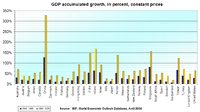
Photo from wikipedia
This article explores the role played by electoral politics in the evolution of postwar growth regimes, understood as the economic and social policies used by governments of the developed democracies… Click to show full abstract
This article explores the role played by electoral politics in the evolution of postwar growth regimes, understood as the economic and social policies used by governments of the developed democracies to pursue economic growth. It charts changes in growth regimes beginning with an era of modernization stretching from 1950 to 1975, through an era of liberalization running from 1980 to 2000, to a subsequent era of knowledge-based growth. Its overarching claim is that the inclination and capacities of democratic governments to pursue specific growth regimes depend not only on economic circumstances but also on evolving electoral conditions, marked especially by changes in the cleavages that condition partisan electoral strategies. This electoral dynamic affects the balance of influence over policy between actors in the electoral and producer-group arenas and carries implications for the social compromises that democracies can construct. The article concludes by exploring the implications of contemporary electoral politics for the development of growth regimes appropriate to a knowledge economy.
Journal Title: Perspectives on Politics
Year Published: 2020
Link to full text (if available)
Share on Social Media: Sign Up to like & get
recommendations!